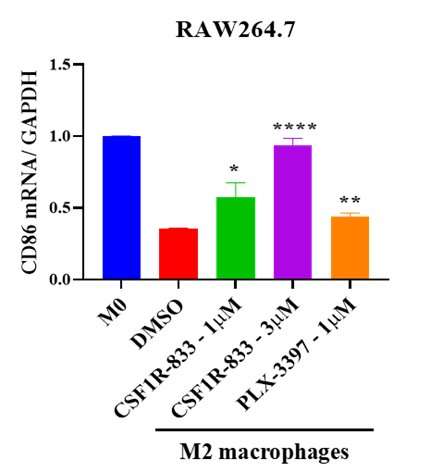Identification of colony stimulating factor 1 receptor offers new strategy for cancer immunotherapy

A potent and selective colony stimulating factor 1 receptor kinase inhibitor IHMT-CSF1R-833 was discovered by researchers led by Prof. Liu Qingsong from the Hefei Institutes of Physical Science (HFIPS) of the Chinese Academy of Sciences.
The study is published in the European Journal of Medicinal Chemistry.
Colony stimulating factor 1 receptor (CSF1R) belongs to the type III growth factor receptor family. CSF1R signaling is crucial for the differentiation and survival of macrophages and plays integral roles in the tumor promoting and immune suppressive functions of tumor-associated macrophages. Suppression of tumor-associated macrophage survival/activation by inhibiting CSF1R signaling becomes a highly attractive strategy for cancer immunotherapy.
Most current CSF1R inhibitors lack proper selectivity among other kinases, making it difficult to correlate their therapeutic efficacies with CSF1R inhibition. Therefore, it is highly desirable to identify the distinct chemical scaffolds CSF1R inhibitors for both preclinical mechanistic and clinical pathological studies.
In this study, the researchers reported a potent and selective CSF1R inhibitor IHMT-CSF1R-833 using a focused medicinal chemistry approach guided by computer-aided drug design.
IHMT-CSF1R-833 exhibited potent inhibitory activity against CSF1R with an IC50 (half maximal inhibitory concentration) value of 5.14 nM, suppressing the phosphorylation of CSF1R and its downstream signals pathway in a dose-dependent manner.
Meanwhile, it showed high selectivity over a broad range of human kinases. Furthermore, IHMT-CSF1R-833 repolarized M2 macrophages to M1 macrophages in RAW264.7 macrophages in a dose-dependent manner.
In vivo, IHMT-CSF1R-833 demonstrated acceptable pharmacokinetic properties for oral administration in rats and exhibited dose-dependent antitumor efficacies in the M-NFS-60 tumor xenograft model.
These results indicate that IHMT-CSF1R-833 may be a valuable research tool for the CSF1R-mediated macrophage in both preclinical mechanistic and clinical pathological studies.
More information: Xiaofei Liang et al, Discovery of Pyrrolo[2,3-d]pyrimidine derivatives as potent and selective colony stimulating factor 1 receptor kinase inhibitors, European Journal of Medicinal Chemistry (2022). DOI: 10.1016/j.ejmech.2022.114782


















